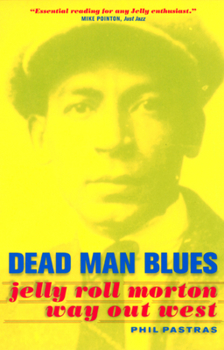Dead Man Blues: Jelly Roll Morton Way Out West
(Part of the Music of the African Diaspora Series)
Select Format
Select Condition 
Book Overview
When Ferdinand "Jelly Roll" Morton sat at the piano in the Library of Congress in May of 1938 to begin his monumental series of interviews with Alan Lomax, he spoke of his years on the West Coast with the nostalgia of a man recalling a golden age, a lost Eden. He had arrived in Los Angeles more than twenty years earlier, but he recounted his losses as vividly as though they had occurred just recently. The greatest loss was his separation from Anita...
Format:Paperback
Language:English
ISBN:0520236874
ISBN13:9780520236875
Release Date:January 2003
Publisher:University of California Press
Length:270 Pages
Weight:1.06 lbs.
Dimensions:0.8" x 5.9" x 9.2"
Customer Reviews
3 ratings
Not a full picture but useful, especially for the specialist
Published by Thriftbooks.com User , 16 years ago
This would be a difficult book to understand for someone not already familiar with the life of Jelly Roll Morton. Focusing on the years Morton spent in California in the 1910s and 1930s, particularly at the beginning, the book focuses on how recent information on Jelly's life on the West Coast sheds new light's personal life on Morton and adds to consensus that despite harrowing conditions, illness that would become fatal, that in the late 1930s Morton was writing some very advanced music that was unfortunately neither recorded nor performed in his lifetime. Be brave and muscle your way through the first part of this book which contains a bit more speculation than this reader would have preferred. The book to start on Morton is _Jelly's Blues: The Life, Music, and Redemption of Jelly Roll Morton_by Howard Reich
Jelly Roll Morton--Only in America!
Published by Thriftbooks.com User , 21 years ago
WOW. After Alan Lomax's _Mr._Jelly_Roll_, this is THE book to get to understand the most boastful musical genius to grace the 1st half of the 20th Century. Jelly Roll Morton claimed to be the "Father of Jazz", and it seems certain that if he wasn't it's father, he was at least waiting in the delivery room at it's birth. This book covers the critical "lost years" of 1916-1922, and has a lot of material that escaped Mr. Lomax's attention when his book was published in 1950--in 53 years, enough has surfaced to justify a treatment like this, and Morton certainly deserves it. Until the transcriptions of his complete Library of Congress Recordings are published, this and Mr. Lomax's book are crucial to understanding this almost-forgotten genius, to whom modern music owes so much.
Insight into a Complex Man
Published by Thriftbooks.com User , 22 years ago
Jelly Roll Morton, the self proclaimed "inventor of Jazz," remains one of the most complex figures in American music. Largely forgotten by the time of his death, Morton had pioneered the early New Orleans style jazz on record and seemed to be on the comeback trail and to be experimenting with the dominant swing style of the 1930s. Pastras provides an insight into Morton by examining his years on the West Coast(roughly the late teens to early twenties and then again in the early 1940s). The first period was among Morton's most satisfying both musically and personally, and the second seems to indicate an attempt at a comeback. Pastras sheds light on Morton's relationships with his godmother and his long time companaion Anita Gonzales and in the process examines the roles played by voodoo and "passing for white" among the Creole community. While the contributions of this book are many, one of the main thrusts is the often conflicting and, at times untrustworthy, nature of oral history as evidenced by Alan Lomax's previous oral history biography of Morton. In the end Lomax's book is more folklore than history. However this does not negate Lomax's contribution, but rather illuminates the pitfalls of not balancing oral history with other evidence if such evidence exists. It is Morton as he wished to present himself to the world. Pastras' text is not only interesting but instructive to those dealing with oral history, but the average reader may want to start with Lomax's book and then move to Pastras' more compelling investigation.





